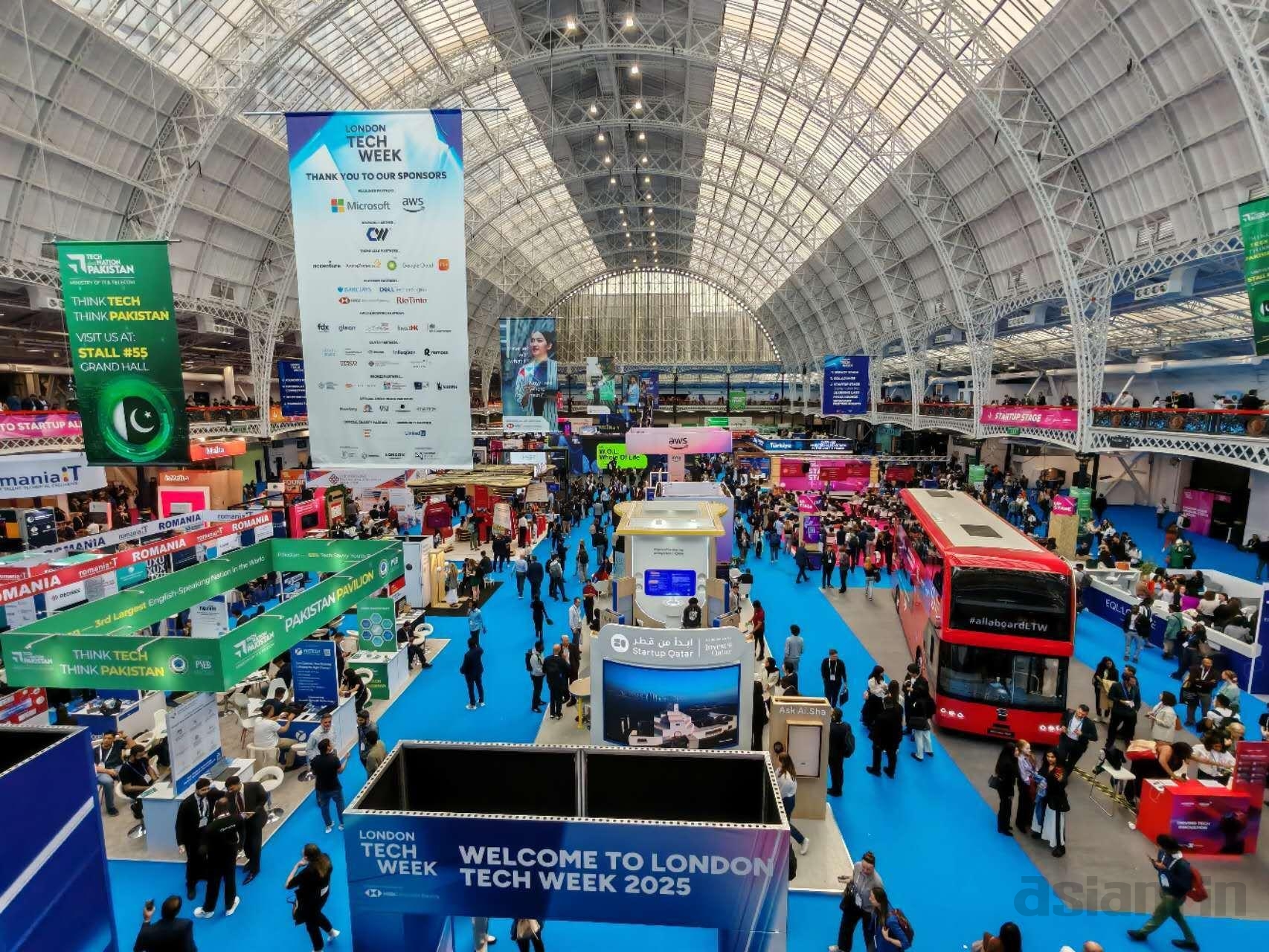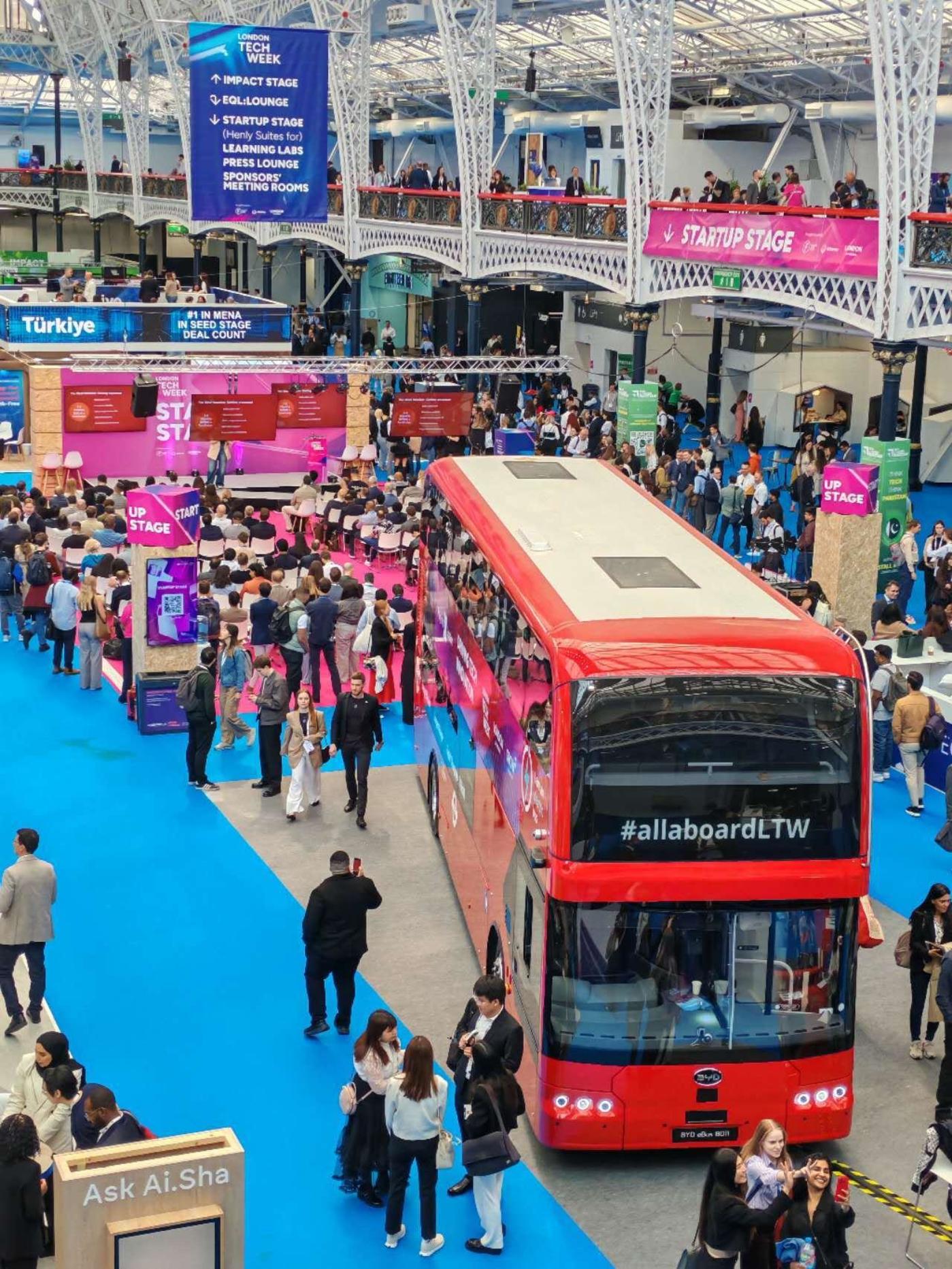By Wenjun Liao
At 8:30 am on June 9, a nearly-100-meter-long lineup had already formed outside London's Olympia Exhibition Centre. As a major tech event expected to attract over 45,000 attendees, London Tech Week 2025 (June 9-13) opened with an ambitious declaration from British Prime Minister Keir Starmer: Britain aims to become the world's 「alternative option」 for artificial intelligence (AI) development after the United States and China 
Ai is at the heart of London Tech Week
Britain's AI Ambition: From Vision to Action
In his opening address, Starmer announced a series of concrete measures positioning Britain as the third AI powerhouse after the United States and China. Most notably, a £1 billion (about $1.36 billion) investment plan aimed at increasing Britain』s computing power by 20-fold.
"So today, I am really delighted to announce what is a step change in how we train homegrown talent in AI. A partnership with 11 major companies to train 7.5 million workers in AI by 2030," Starmer said. He also announced a £185 million (about $251.98 million) tech-first training program targeting one million young people.
Starmer emphasized practical AI applications. "We're looking at how AI can speed up discharges from hospitals—hugely important. I've looked into this in our hospitals. Getting people out the back door more quickly—AI can help with that. Same with the asylum backlog, how can AI and tech help us deal with that? Or teachers—helping them personalize lessons for their pupils," he said.
The growth rate of the British AI industry is remarkable. "Look at these raw numbers. This industry supports over 2 million jobs. That's incredible. Here's another statistic: in 2023, our AI industry grew 30 times faster than the rest of the economy," Starmer said in his speech.
Jensen Huang: Britain at AI's 「Goldilocks」 Moment
The dialogue between Nvidia CEO Jensen Huang and Starmer became a focal point of the conference. Huang used "Goldilocks circumstance」 to describe Britain』s current AI development status—a fairy tale metaphor meaning "just right".「
Huang identified two core advantages of Britain』s AI ecosystem. First, a world-class AI talent pool. Huang said, "The UK has one of the richest AI communities anywhere on the planet. The deepest thinkers, the best universities—Oxford, Cambridge, Imperial College—and outstanding computer science thinkers.」 He mentioned star companies rooted in Britain, including Google DeepMind, autonomous driving company Wayve, AI video generation company Synthesia, and AI voice technology company ElevenLabs. Second, a robust venture capital environment.
Huang noted that Britain is "the third largest AI venture capital investment anywhere in the world," after only the U.S. and China, and "the largest AI investment region in the rest of the world." As he put it: "Between these two concepts—you have an abundance of computer scientists, this is a fantastic place for venture capitalists to invest, the ecosystem is really perfect for takeoff."
Regarding Starmer's previously announced £1 billion infrastructure investment plan, Huang called this "such a significant move," believing it would trigger a "flywheel effect" for Britain's AI development. "Infrastructure enables more research, more research, more breakthroughs, more companies. That flywheel will start taking off," Huang explained.
To support Britain's AI ambitions, Nvidia announced several specific measures: expanding its Bristol laboratory, launching AI talent collaboration programs, and building new training centers. Meanwhile, the Britain』s Financial Conduct Authority (FCA) announced that it will collaborate with NVIDIA to launch the "Supercharged Sandbox" program, allowing British financial services firms to experiment with AI technology. Additionally, a Britain Sovereign AI Industry Forum was established, with participants such as BAE Systems, BT, and Standard Chartered Bank, demonstrating high-level government and corporate commitment to AI development. Huang's appearance at London Tech Week was described by CNBC as receiving "Iron Man"-like star treatment, and his public support for the Britain's AI potential was widely seen as an important endorsement of Britain's tech ambitions on the global stage.
New Product and Technology Launches
London Tech Week 2025 served not only as a stage for policy declarations but also as an important launch pad for technologies and products. This year's conference witnessed several significant technology releases and collaboration announcements.
French AI company Mistral AI launched its first reasoning model, Magistral. Magistral comes in two versions: an open-source version called Magistral Small with 24 billion parameters, and a more powerful enterprise version, Magistral Medium. Magistral』s CEO Arthur Mensch emphasized that the product』s unique selling point lies in its multilingual reasoning capabilities. "Historically, we've seen U.S. models reason in English and Chinese models reason in Chinese while Mistral's model can reason in multiple European languages」. The model supports English, French, Spanish, German, Italian, Arabic, Russian, and Simplified Chinese, and achieves response speeds 10 times faster than competitors on the Le Chat platform, according to Mistral AI』s website.
Microsoft UK CEO Darren Hardman announced a major collaboration project at the event. Barclays Bank will deploy Microsoft 365 Copilot to its 100,000 employees worldwide. The rollout marks one of the largest generative AI implementations in banking to date. This collaboration will create a "Colleague AI Agent" integrated into Barclays' own employee productivity tools, enabling staff to access the bank's extensive ecosystem of collaboration tools, portals, and online resources from a single interface. The agent will help employees perform various tasks, such as booking business travel, checking policy compliance, or finding answers to HR-related questions.
On the exhibition floor, AI-powered enterprise search platform Glean showcased its latest internal search tools, capable of seamlessly finding and understanding enterprise information while offering summarization and content creation capabilities based on provided data. Glean has established partnerships with major enterprises including Nvidia, Okta, and Booking.com. Additionally, similar solutions specifically targeting SMEs, such as Quench AI, also appeared at the exhibition.
The conference featured a dedicated ClimateTech startup showcase, where multiple companies demonstrated breakthrough innovations addressing the world's most pressing environmental challenges, covering a broad range from renewable energy solutions to other green technologies.
BYD's High-Profile Appearance
At the venue entrance, a red double-decker bus bearing the BYD logo was eye-catching. As one of the few Chinese companies with a high-profile presence at London Tech Week, BYD's participation reflects its rapid expansion in the British market.
BYD's double-decker bus in London Tech Week
In 2024, BYD's sales in Britain surged by 658% to about 8,700 vehicles, making the brand Britain's fastest-growing automotive one. The company's market share jumped from 0.17% in January 2024 to 0.96% in December 2024, with retail outlets expanding from 14 to 60. Brand awareness soared from just 1% in 2023 to 31% in 2024, a leap largely attributed to strategic marketing initiatives, including high-profile sponsorship of the Euro 2024 football championship. BYD Chairman Wang Chuanfu told analysts in a March earnings call that the company aims to double overseas sales to over 800,000 units in 2025. He also expected its market share to "rise substantially" in Britain, which is "very open to Chinese competitive products." In Q1 2025, BYD sold 9,271 vehicles in Britain, exceeding its entire 2024 sales. The Q1 performance pushed BYD's Britain market share from 0.45% in 2024 to 1.6%.
Apart from BYD, not many Chinese tech giants showed up at this year's London Tech Week. While an official "UK-China Connect & Growth Reception" was arranged, hosted by the Department for Business and Trade (DBT) and London & Partners, supported by the Bank of China』s London Branch, the number of Chinese companies was notably lower compared to the record-breaking Indian tech delegation. According to data published by London & Partners, this year's Tech Week welcomed over 350 Indian companies, the largest number of Indian tech firms in history. Starmer emphasized in his opening address that Britain is "determined to create new markets—whether in India, the US, or Europe," demonstrating his resolve to strengthen British-Indian tech cooperation.
London Tech Week's startup competition showcased the vitality of the British tech ecosystem. Eight finalists covered various fields from Data Wallet's consumer data sharing platform to QuestPrehab's AI-driven patient optimization system.
Photo credit: Liao Wenjun
Ultimately, Uhubs won the £1 million grand prize for its intelligent talent recruitment, training, and performance optimization solutions for B2B sales teams. Peter Kyle, Secretary of State for Science, Innovation and Technology, presented the award.
London Tech Week 2025 sent a clear signal: Britain is going all-out to build an AI powerhouse in addition to the U.S. and China. The government's massive investment commitments, deep collaboration with industry giants, and the concept of positioning AI as a "social equalizer" rather than an elite tool all demonstrate Britain』s unique development path.
